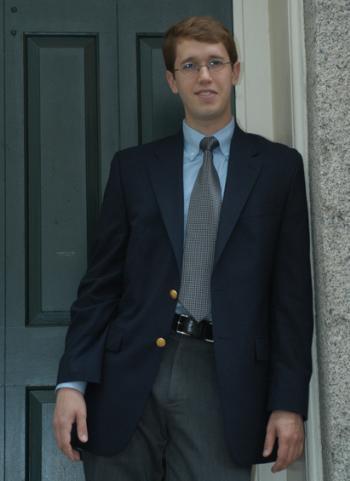In Rome, Charles B. Watson ’03 spent a summer working in the Vatican with the secretary who oversees the correspondence of Pope John Paul II—in Latin. In Cambridge, he revived the Harvard Classical Club, which had been dormant for a decade. Today, Watson is poised to fulfill a dream he has pursued since he first set foot in the Yard—delivering the Latin Oration at Harvard’s 352nd Commencement.
“Four years ago, I said, ‘I am going to do this,’” Watson says. “I wanted to do it from the get-go.”
A classics concentrator, Watson has been studying Latin for nine years. His senior thesis examines the Roman orator Cicero’s use of comedy to enliven audiences.
Watson’s six-minute speech, which he must deliver from memory, is entitled “De Ignotis,” translated as “On the Forgotten.” The address discusses how the most important monuments of success are the people of today, for they represent their ancestors’ accomplishments.
Watson says he represents a triumph for his own family. His blue-collar grandparents gave up their dreams of graduating from college in order to earn money to support their families.
Watson’s speech emphasizes the continual process of achieving success.
“You’re not a culmination of these efforts, but a continuation,” he says.
When writing his speech, Watson called on his extensive research into Cicero’s rhetorical techniques. For example, as Cicero once did in the Roman Forum, Watson uses references to his surroundings to enhance his speech. His flourishes today will include pointing to buildings such as Widener, Weld and Emerson, which he says serve as monuments to the success of the families for whom they are named.
“His delivery is improving by the day and his oration will be well-received,” says Richard F. Thomas, professor of Greek and Latin, who selected Watson’s speech from the two submissions he received. “It will be a very dramatic and rhetorically impressive presentation.”
A Scholar and a Neat Freak
Watson may imitate Cicero, but he won’t sound quite like him. Born and raised in South Carolina, Watson speaks with a slight Southern drawl.
An only child from a “morally and religiously conservative family,” as he puts it, his meticulous approach to studying ancient texts carries over into all aspects of his life.
Neatly dressed in a buttoned shirt and khakis, with a brown belt matching his shoes, Watson keeps his academic planner close at hand. He reaches for it as he writes himself reminder notes and as he checks his daily commitments. The planner is a whirlwind of blue ink and yellow highlighter, as each academic and social engagement is written neatly in its proper slot.
His Currier House room echoes this precision. As Watson explains, his books are systematically arranged and his drawers are divided by clothing type and color—his socks are sorted by whites and colors and then further sub-divided.
Burnett F. King ’03, who has lived with Watson since their first-year days in Stoughton, emphasizes his passion for the classics. He recalls Watson’s excitement after getting a good price on an unabridged Latin-English dictionary.
“I just remember him being a nerd, being all excited about the dictionary,” King says.
Often enrolling in five classes per semester, he has taken 20 classes in the Classics department, far surpassing the 12-course minimum requirement.
Along with his intellectual curiosity, a bit of luck may have also been involved in Watson’s achievements in the Classics department.
With a last name near the end of the alphabet, Watson was assigned a mailbox in the Classics office that was fortuitously located next to a cubby for the Harvard Classics Club. Week after week Watson noticed that the club’s box remained empty. After looking through archives and talking with administrators, he discovered the inactive club, which had been founded in 1885, had produced Greek plays in Harvard Stadium.
He revived the club and assumed its presidency. This year, he produced a Roman comedy, The Menaechmi of Plautus, in Agassiz Theater. With four performances, the play attracted more than 600 people.
Well-known and well-liked, Watson “was a great asset for the department,” says Andreola F. Rossi, assistant professor of the classics. “He has a rare enthusiasm for Latin. It is quite unbelievable. He loves the language, he loves to study it. He motivates all the other students.”
Carolina, Rome On His Mind
Watson’s dorm reveals his extensive European travels. His bedroom is decorated with a calendar from Italy, in addition to posters of Roman and Greek sculptures.
In addition to visiting Rome four times, Watson spent seven weeks last summer at the American School for Classical Studies at Athens.
After traveling in Greece, Watson undertook an independent study in southern Italy.
During the year, Watson also ventures away from Harvard Yard, but he usually only makes it as far as the movie theater in Boston or a restaurant in the Square, King says.
While few things excite Watson more than classics, his eyes bulge at the mention of Southern cooking.
“Sweet corn, tomatoes, bacon, sweet potatoes, fried chicken,” Watson gushes. “When I have money, I buy food or books.”
While Watson’s desire to deliver the Latin Oration was a constant since his matriculation, his post-Harvard plans remain a bit less defined.
He will travel to Oxford next year on the Corey Fellowship, where he will continue his classicist focus, studying both Greek and Latin.
After one to three years in England, his plans are unclear. Law school and academia remain possibilities.
“I have never been so unsure of what I am going to do as I am now,” Watson says.
Whatever he ultimately does, Watson feels that his Latin scholarship will provide a solid background.
“Classics is a means, not an ends,” he says. “Classics is a mental preparation. It’s a humanizing art.”
—Staff writer Faryl W. Ury can be reached at ury@fas.harvard.edu.
Read more in News
Pataki: 'Yale is Going to Crush Harvard'













